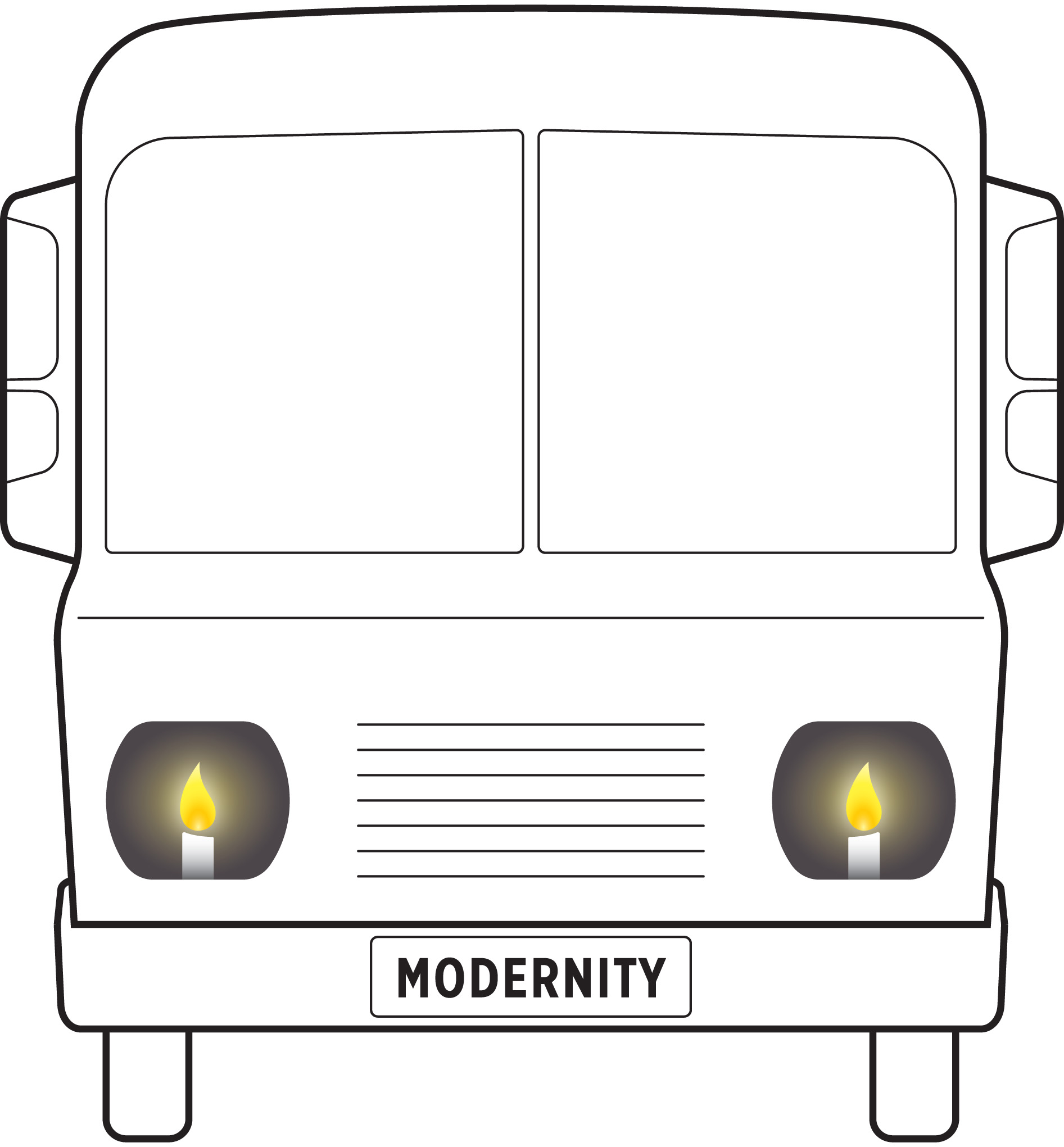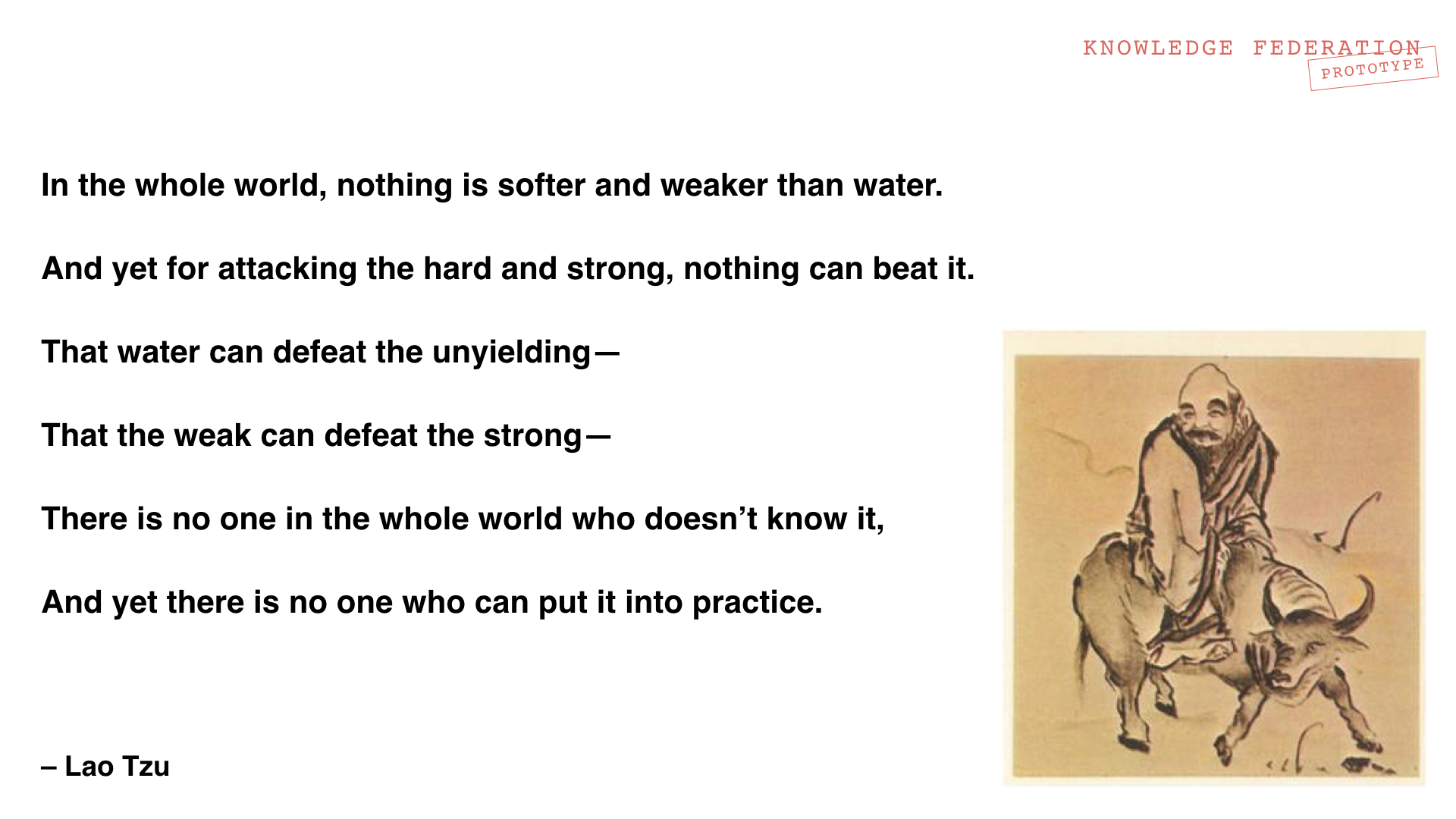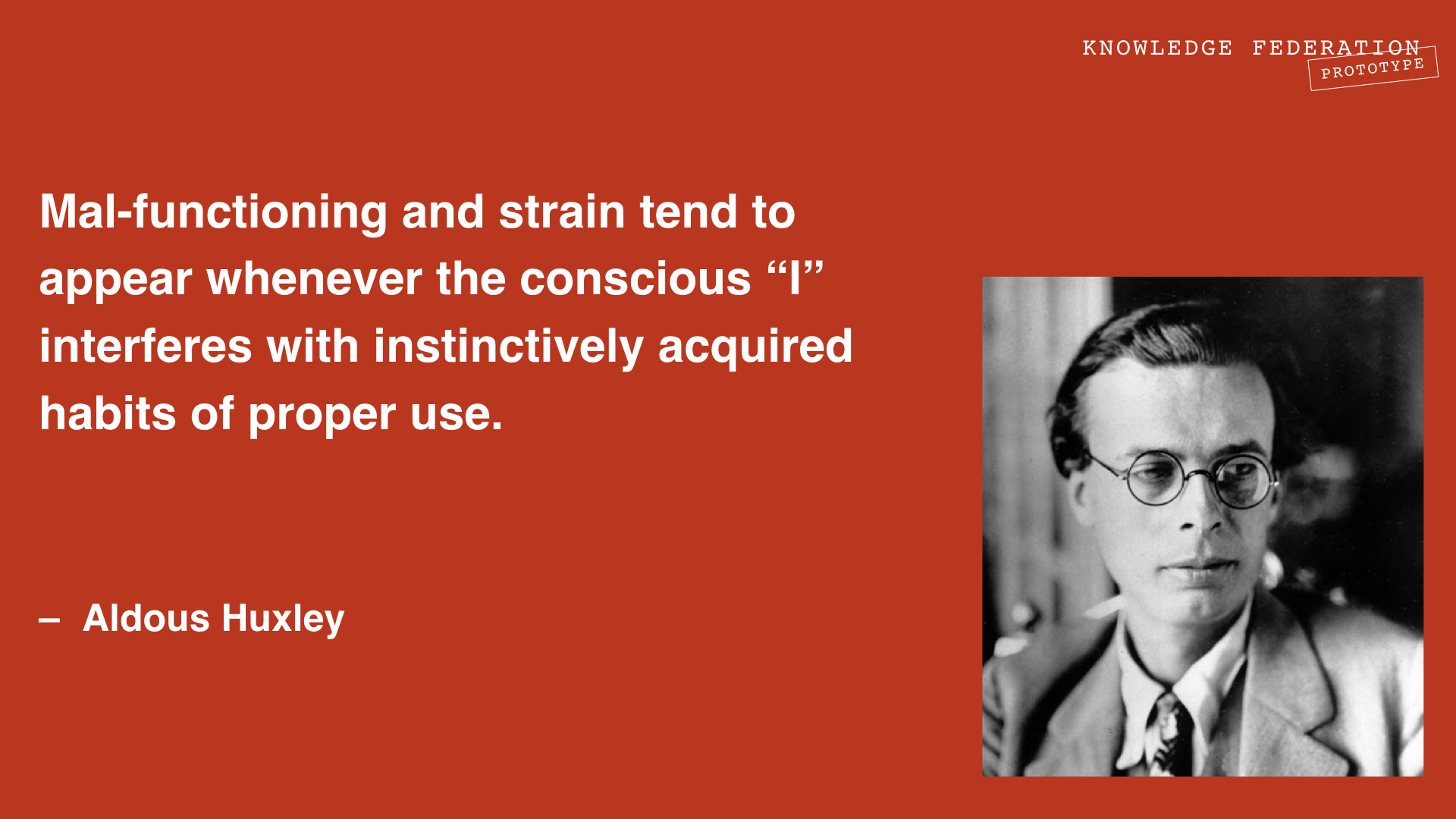Difference between revisions of "Holotopia"
m |
m |
||
| Line 750: | Line 750: | ||
<div class="col-md-7"><h3><em>Scope</em></h3> | <div class="col-md-7"><h3><em>Scope</em></h3> | ||
| − | <p> | + | <p>We turn to culture and to "human quality", and ask: </p> |
| − | |||
| − | < | + | <blockquote> |
| + | <b>Why</b> is "a great cultural revival" realistically possible?</blockquote> | ||
| − | <p> | + | <p>What insight, and what strategy, may divert our"pursuit of happiness" from material consumption to human cultivation?</p> |
| − | < | + | <p>We may approach our theme also from a different angle: Suppose we substituted <em>real</em> information, <em>federated</em> from the world traditions, academic disciplines and other relevant sources, for advertising, and allowed it to orient our values and our choices. What new insights would emerge? What difference would they make?</p> |
| − | < | + | <p>During the Renaissance, preoccupations with "original sin" and "Heavenly reward" were replaced by a pursuit of beauty and happiness here and now—and their celebration through the arts.</p> |
| − | < | + | <blockquote> What might the <em>next</em> "great cultural revival" be like? </blockquote> |
| − | < | + | <h3>Diagnosis</h3> |
| − | <p> | + | <p>Nowhere are our cultural biases as clearly visible as here. </p> |
| − | <p> | + | <p>To pursue happiness 'in the light of a candle' means to pursue <em>convenience</em>—whatever <em>appears</em> attractive at the moment. <em>Convenience</em> has the added advantage that it appears to us as empirical and exact, and hence "scientific". </p> |
| + | <p>There is, in addition, the value of <em>egotism</em> or ego-centeredness—endlessly supported by advertising. <em>Egotism</em> too appears "scientific"—being, according to Darwin, the way in which the nature herself pursues <em>wholeness</em>. </p> | ||
<h3>Remedy</h3> | <h3>Remedy</h3> | ||
| − | <p> | + | <p>The <em>convenience paradox</em> insight—by which we point to a remedial course—may be understood in terms of three more specific insights. In a quite spectacular manner, those three insights become transparent as soon as we abandon our fascination with the stories or <em>socialized realities</em>—and focus on the <em>relevant</em> human experience that our traditions embody.</p> |
| − | |||
| − | < | ||
| − | < | + | <ul> |
| + | <li><em>Human wholeness exists</em>—and it feels dramatically or <em>qualitatively</em> better than what our culture lets us experience, or even conceive of</li> | ||
| − | < | + | <li><em>The way to it is paradoxical</em>—and needs to be illuminated by suitable information</li> |
| − | < | + | <li><em>Human quality</em> plays in it an essential role</li> |
| + | <ul> | ||
| − | <p> | + | <p>While these insights will become clear as we make progress toward <em>holotopia</em>, a few hints will suffice to prime that quest.</p> |
| − | <p> | + | <p>The first of the three insights, which we've branded "the best kept secret of human culture", is what made our ancestors flock around "enlightened" beings like the Buddha or the Christ. It can, however, also be easily verified by simply asking the people who have "done the work".</p> |
| − | |||
<p> | <p> | ||
[[File:LaoTzu-vision.jpeg]] | [[File:LaoTzu-vision.jpeg]] | ||
</p> | </p> | ||
| − | <p> | + | <p>To get a glimpse of the second insight, compare the above typical utterances by Lao Tzu, with what Christ taught in his Sermon on the Mount. Why was Teacher Lao saying that "the weak can defeat the strong"? Why did the Christ demand to "turn the other cheek"?</p> |
| − | |||
<p> | <p> | ||
[[File:Huxley-vision.jpeg]] | [[File:Huxley-vision.jpeg]] | ||
</p> | </p> | ||
| − | <p> | + | <p>To get a glimpse of the third, we may zoom in on a contemporary story. Coming from a family that gave some of Britain's leading scientists, Aldous Huxley undertook to <em>federate</em> some of the core elements of the new kind of science that we here see emerge. His "Perennial Philosophy" is alone largely sufficient to make a convincing case for the basic insight—that there <em>is</em> a "natural law" governing human wholeness, which we in our culture vastly violate and ignore. On a much more subtle note, the above quotation, from "The Art of Seeing", will suggest that <em>overcoming</em> egotism is necessary even for mastering <em>physical</em> skills!</p> |
| − | <p> | + | |
| + | <p>We illustrate the course of action that can lead to "a great cultural revival" and to <em>holotopia</em> by a handful of <em>keywords</em> and <em>prototypes</em>. </p> | ||
| + | |||
| + | <p>We defined <em>culture</em> as "<em>cultivation</em> of <em>wholeness</em>", where the keyword <em>cultivation</em> is defined by analogy with planting and watering a seed. A key point here (intended as a parable) is to observe that no amount of dissecting and studying a seed would suggest that it needs to be planted and watered. And hence that <em>cultivation</em> profoundly depends on taking advantage of the experience of others—regarding how certain actions produce certain effects <em>in the long run</em>. As soon as we apply the same idea to <em>human</em> cultivation—similarly spectacular insights and the opportunities come within reach.</p> | ||
| + | |||
| + | <p>We defined <em>addiction</em> as a <em>pattern</em>, and offered it as part of the remedy for the following anomaly. Since selling addictions has always been lucrative yet destructive, the <em>traditions</em> identified certain activities or <em>things</em> (such as opiates and gambling) as addictions and developed suitable legislation and ethical norms. But with the help of technology, contemporary industries can develop hundreds of <em>new</em> addictions—without us having a way to even recognize them as that. </p> | ||
| − | <p> | + | <p>We defined <em>religion</em> as "reconnection with the <em>archetype</em>". The <em>archetypes</em> here include "justice", "beauty", "truth", "love" and anything else that may make a person overcome <em>egotism</em> and <em>convenience</em> and serve a "higher" ideal.</p> |
| − | <p> | + | <p>We developed the "Movement and Qi" educational <em>prototype</em> as a way to add to the conventional academic portfolio a collection of ways to use human <em>body</em> as medium—and work with "human quality" directly.</p> |
<p>The book "Liberation" subtitled "Religion beyond Belief" is an ice breaker. It <em>federates</em> "the best kept secret", and creates a <em>dialog</em>. </p> | <p>The book "Liberation" subtitled "Religion beyond Belief" is an ice breaker. It <em>federates</em> "the best kept secret", and creates a <em>dialog</em>. </p> | ||
| − | |||
Revision as of 12:42, 28 August 2020
Contents
HOLOTOPIA
An Actionable Strategy
Imagine...
You are about to board a bus for a long night ride, when you notice the flickering streaks of light emanating from two wax candles, placed where the headlights of the bus are expected to be. Candles? As headlights?
Of course, the idea of candles as headlights is absurd. So why propose it?
Because on a much larger scale this absurdity has become reality.
The Modernity ideogram renders the essence of our contemporary situation by depicting our society as an accelerating bus without a steering wheel, and the way we look at the world, try to comprehend and handle it as guided by a pair of candle headlights.
Scope
We turn to culture and to "human quality", and ask:
Why is "a great cultural revival" realistically possible?
What insight, and what strategy, may divert our"pursuit of happiness" from material consumption to human cultivation?
We may approach our theme also from a different angle: Suppose we substituted real information, federated from the world traditions, academic disciplines and other relevant sources, for advertising, and allowed it to orient our values and our choices. What new insights would emerge? What difference would they make?
During the Renaissance, preoccupations with "original sin" and "Heavenly reward" were replaced by a pursuit of beauty and happiness here and now—and their celebration through the arts.
What might the next "great cultural revival" be like?
Diagnosis
Nowhere are our cultural biases as clearly visible as here.
To pursue happiness 'in the light of a candle' means to pursue convenience—whatever appears attractive at the moment. Convenience has the added advantage that it appears to us as empirical and exact, and hence "scientific".
There is, in addition, the value of egotism or ego-centeredness—endlessly supported by advertising. Egotism too appears "scientific"—being, according to Darwin, the way in which the nature herself pursues wholeness.
Remedy
The convenience paradox insight—by which we point to a remedial course—may be understood in terms of three more specific insights. In a quite spectacular manner, those three insights become transparent as soon as we abandon our fascination with the stories or socialized realities—and focus on the relevant human experience that our traditions embody.
- Human wholeness exists—and it feels dramatically or qualitatively better than what our culture lets us experience, or even conceive of
- The way to it is paradoxical—and needs to be illuminated by suitable information
- Human quality plays in it an essential role
While these insights will become clear as we make progress toward holotopia, a few hints will suffice to prime that quest.
The first of the three insights, which we've branded "the best kept secret of human culture", is what made our ancestors flock around "enlightened" beings like the Buddha or the Christ. It can, however, also be easily verified by simply asking the people who have "done the work".
To get a glimpse of the second insight, compare the above typical utterances by Lao Tzu, with what Christ taught in his Sermon on the Mount. Why was Teacher Lao saying that "the weak can defeat the strong"? Why did the Christ demand to "turn the other cheek"?
To get a glimpse of the third, we may zoom in on a contemporary story. Coming from a family that gave some of Britain's leading scientists, Aldous Huxley undertook to federate some of the core elements of the new kind of science that we here see emerge. His "Perennial Philosophy" is alone largely sufficient to make a convincing case for the basic insight—that there is a "natural law" governing human wholeness, which we in our culture vastly violate and ignore. On a much more subtle note, the above quotation, from "The Art of Seeing", will suggest that overcoming egotism is necessary even for mastering physical skills!
We illustrate the course of action that can lead to "a great cultural revival" and to holotopia by a handful of keywords and prototypes.
We defined culture as "cultivation of wholeness", where the keyword cultivation is defined by analogy with planting and watering a seed. A key point here (intended as a parable) is to observe that no amount of dissecting and studying a seed would suggest that it needs to be planted and watered. And hence that cultivation profoundly depends on taking advantage of the experience of others—regarding how certain actions produce certain effects in the long run. As soon as we apply the same idea to human cultivation—similarly spectacular insights and the opportunities come within reach.
We defined addiction as a pattern, and offered it as part of the remedy for the following anomaly. Since selling addictions has always been lucrative yet destructive, the traditions identified certain activities or things (such as opiates and gambling) as addictions and developed suitable legislation and ethical norms. But with the help of technology, contemporary industries can develop hundreds of new addictions—without us having a way to even recognize them as that.
We defined religion as "reconnection with the archetype". The archetypes here include "justice", "beauty", "truth", "love" and anything else that may make a person overcome egotism and convenience and serve a "higher" ideal.
We developed the "Movement and Qi" educational prototype as a way to add to the conventional academic portfolio a collection of ways to use human body as medium—and work with "human quality" directly.
The book "Liberation" subtitled "Religion beyond Belief" is an ice breaker. It federates "the best kept secret", and creates a dialog.
</div> </div>



